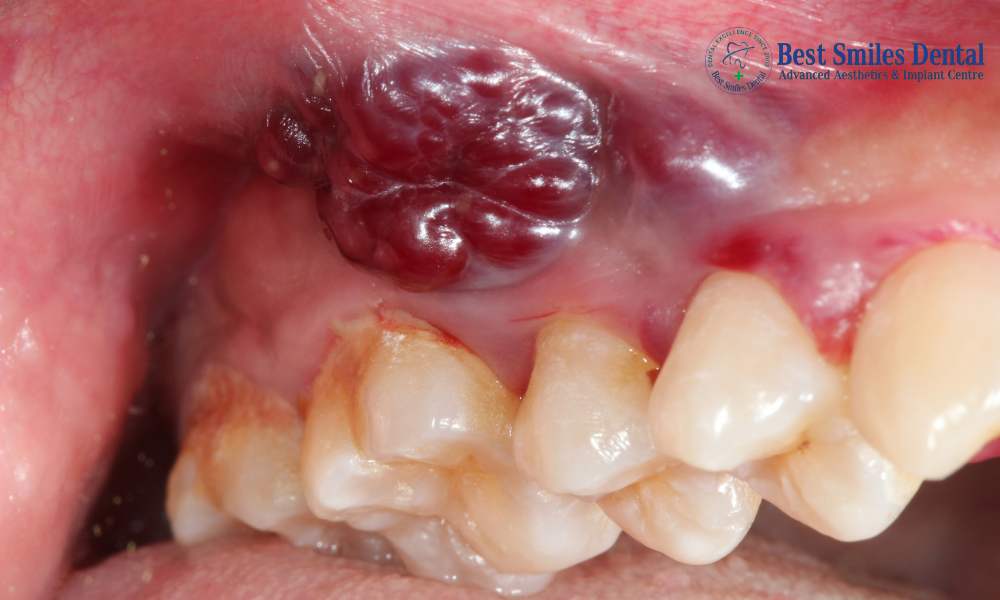Oral Cancer Screening
Oral Cancer Screening
Need Appointment ?
Oral Cancer Screening
An oral cancer screening is an exam to look for signs of cancer in mouth. Oral cancers include mouth cancer, jaw cancer and tongue cancer.
The areas examined during an oral cancer screening:
- Cheek lining
- Floor and roof of your mouth
- Gums
- Lips
- Tongue
- Tonsils
Book Appointment to find out which treatment might be best for you at Best Smiles Advanced Dental Clinic.
Why are oral cancer screenings so important?

Oral cancer is a common cancer of head and neck, affecting people.
Oral cancer has a five-year survival rate of 57%. This means that just a little more than half of the people diagnosed with oral cancer are alive five years after their diagnosis. Oral cancer isn’t particularly difficult to diagnose. But fatality rates are high because oral cancer is too often detected late in its development. Oral cancer screenings are the best tool available for early diagnosis and treatment.
When is an oral cancer screening recommended?
Healthcare professionals use oral cancer screenings to find cancer before symptoms occur. When providers detect oral cancer in its early stages, treatment may be more successful.
How is early oral cancer detected?
Oral cancer screenings can help detect early signs of oral cancer. But the only surefire way to find out if you have oral cancer is to collect suspicious cells and test them in a laboratory. If your healthcare professionals suspects oral cancer, then they’ll refer you to another specialist for evaluation.
What happens after the oral cancer screening?
As screenings look for signs of cancer. But you’ll need more testing to get an official diagnosis.
After your oral cancer screening, your healthcare professionals will share their findings with you. If the screening indicates that cancer could be present, your provider will refer you to a specialist for further assessment. Tests may include:
- Cytology. A provider collects cells from your mouth with a brush, piece of cotton or wooden stick. Then, a pathologist looks at the cells under a microscope to see if they’re abnormal.
- Biopsy. During this test, a provider removes a portion of the abnormal tissue and sends it to a pathologist for analysis.
Your healthcare professionals may also recommend a follow-up visit in a week or so to see if the lesion has changed or healed on its own.

Pain-Free Dentistry
Comfortable, stress-free treatments every time.

Next-Gen Equipments
Precision care with advanced technology.

Expert Care Guaranteed
Trusted specialists for superior oral health.
Frequently Asked Questions
Discover everything you need to know about professional tooth cleaning and polishing. Learn how it removes plaque, enhances your smile, and promotes better oral health.
Oral cancer screening is a preventive dental procedure in which a dentist examines your mouth, tongue, and throat to detect early signs of oral cancer or precancerous conditions. Early detection increases the chances of successful treatment.
Your healthcare professionals may use a combination of oral cancer screening methods, as a visual exam, palpation, and oral screening dyes and lights. They may also take photos of any abnormal areas so they can monitor them. In general, screenings take less than five minutes.
Oral cancer screening is recommended for adults, especially those with risk factors such as tobacco use, heavy alcohol consumption, a family history of cancer, or prolonged exposure to the sun (which can cause lip cancer). Regular screenings are essential for individuals over 40 or anyone with suspicious oral symptoms.
No, oral cancer screening is a non-invasive and painless procedure. It typically takes only a few minutes during your routine dental checkup.
Many dental insurance plans include oral cancer screening as part of routine dental exams. However, coverage varies, so it’s best to check with your insurance provider.

